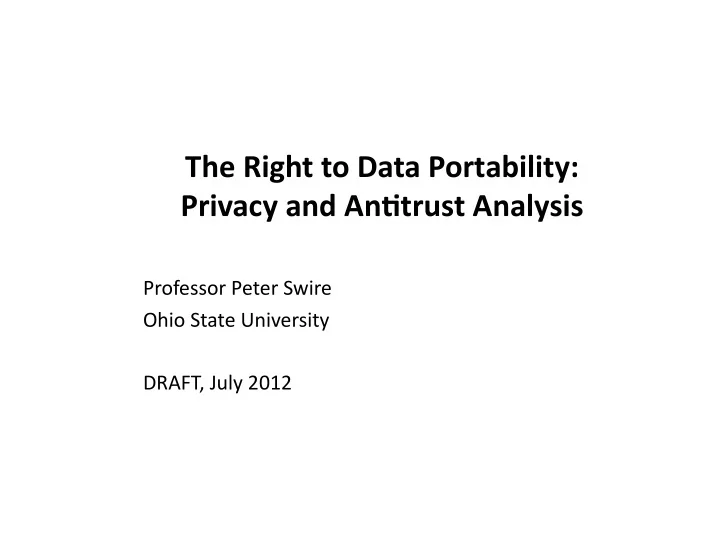

The Right to Data Portability: Privacy and An7trust Analysis Professor Peter Swire Ohio State University DRAFT, July 2012
Overview • EU Right of Data Portability (RDP) in draE Privacy Reg – IntuiHon that “you” should get “your” data back – IntuiHon that compeHHon enhanced if data is not locked in • AnHtrust analysis of RDP – Unlikely that increases anHtrust version of consumer welfare • EU human rights perspecHve on RDP • Open source perspecHve on RDP • Disclaimer – sHll developing these thoughts
Art. 18: Right to Data Portability 1. “The data subject shall have the right, where personal data are processed by electronic means and in a structured and commonly used format, to obtain from the controller a copy of data undergoing processing in an electronic and structured format which is commonly used and allows for further use by the data subject.” 2. “The data subject shall have the right to transmit those personal data and any other informaHon provided by the data subject … without hindrance from the controller.”
GeUng “Your” Data Back 1. You get a copy of “your” data 2. You supplied it 3. Without hindrance from the controller 4. In a form that allows for further use 5. Only applies to electronic data 6. “In a structured and commonly used format” Favorable intuiHons: 1. RDP can reduce lock‐in 2. RDP allows second and third movers to compete despite network effects
A HypotheHcal (1 of 3) • One type of soEware • Another type of soEware • Company decides to offer them together, as an integrated product • OK under anHtrust law?
A HypotheHcal (2 of 3) • One type of soEware: Calculator • Another type of soEware: OperaHng System • Company decides to offer them together, as an integrated product • OK under anHtrust law? – What’s in your computer now?
A HypotheHcal (3 of 3) • One type of soEware: OperaHng System • Another type of soEware: Browser • Company decides to offer them together, as an integrated product • OK under anHtrust law? – What’s in your computer now?
Pladorm SoEware & AnHtrust • MicrosoE case: – Rule of reason for “tying arrangements involving pladorm soEware products” • Pladorms are “structured formats” that are “commonly used” – Emphasizes efficiencies from integraHon & pervasive innovaHon – “Not only is integraHon common in such markets, but it is common among firms without market power” – Per se rule for tying has “undue risks of error and of deterring welfare‐enhancing innovaHon”
Apply to Social Networks • MicrosoE: ROR “where the tying product is soEware whose major purpose is to serve as a pladorm for third‐party applicaHons and the Hed product is complementary soEware funcHonality” • Tying product: G+ or Facebook • Tied product: soEware module for how data does/does not get exported • MicrosoE case rejected per se approach • EU has per se approach in ArHcle 18
Rule of Reason & Efficiencies • Benefits to consider for soEware without RDP: – IntegraHon efficiencies, but RDP would require costly coding – Pervasive innovaHon, but RDP reduces incenHve to do costly coding for the next release • Avatars for each online game – should be portable? • Reduce incenHve to produce the cool game that is sHcky and keeps players?
Summary on AnHtrust • US anHtrust law (and I think EU compeHHon law) – reject per se rule against soEware integraHon • Rule of reason looks at benefits as well as costs of tying arrangement/integraHon in each market • AnHtrust law does this with goal of enhancing consumer welfare
Response 1: Fundamental Right • EU Data ProtecHon approach – personal data implicates fundamental human rights • Longstanding “right to access” to your own data • “Right to data portability” an extension of principle that it is “your” data, not the controller’s
Fundamental Right • InteresHng quesHon of how to create/assert/ define a new fundamental human right – RDP not “originalist” right, not in ECHR, etc. • Art. 18 admits doesn’t know how to define its scope • PotenHal or likely loss of consumer welfare makes support for RDP more quesHonable
Response 2: Open is Good • US tech community support for “data liberaHon” and “data portability” • “Open data” a good fit with “open source” • Tim Berners‐Lee: unleash innovaHon and mobility if “our” data is open & portable • Portability can empower users vis‐à‐vis soEware providers • Concern about lock‐in effect from suppliers with market power
Open is Good • If accept the MicrosoE case, then soEware writers can innovate and integrate beqer without intrusive regulatory intervenHon • Fast‐changing data formats and pracHces a bad fit for per se regulatory approach • The debate deserves more thought between – “Open is good” and – “IntegraHon & innovaHon are good” as in MicrosoE case
Conclusion • IntuiHon of “lock in” teams with human rights claims to support RDP • Serious quesHons, however, about this per se rule under anHtrust law • The sweeping, per se rule under ArHcle 18 deserves much greater scruHny than it has received
Recommend
More recommend